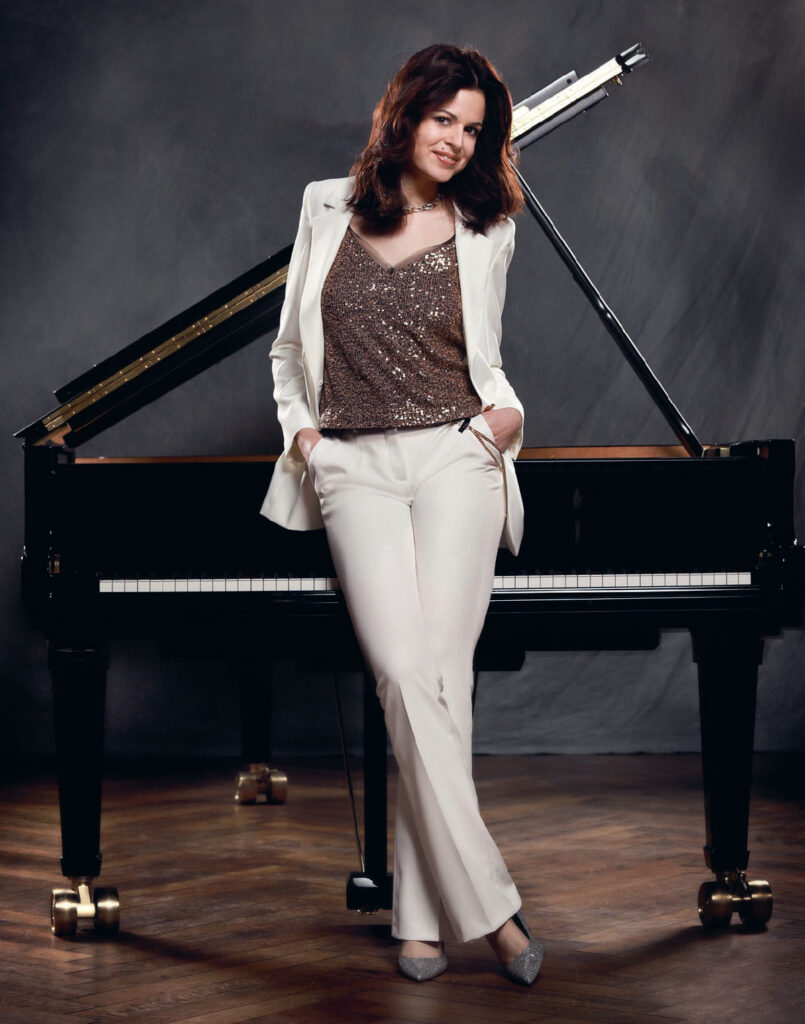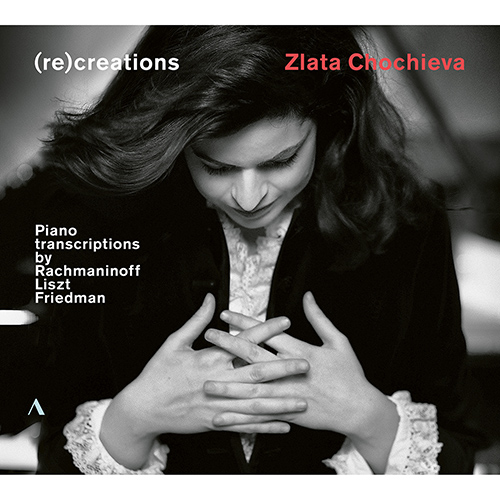The Transcription – Zlata Chochieva
Zlata Chochieva is one of the most interesting musicians of her generation, with her breathtaking technique and musicality as well as with her choice of repertoire. “(re)creations”, her latest CD, offers an exquisite collection of transcriptions by her great heroes, Rachmaninoff, Liszt and Friedman, and in the title lies the secret of this special art form, so closely related to the piano.

Please tell me how you are coping with these challenging times…
It is very difficult not being able to communicate with your audience, but it would be even more pity not to use that time as productive as possible. And I am happy and lucky to say that I have been busy! I took part in several online-concerts, and projects such as “Concerts in Quarantine” of the great film director Jan Schmidt-Garre, from the Schinkel Pavillon in Berlin, saved us, musicians, from silence. I also had a chance to focus my mind on my new CD project starting my collaboration with the Accentus label. It is always different and special to work in a recording studio, which is a completely different world, without audience. You are alone playing for microphones. In that moment you realize how important is to have another pair of ears behind the wall – the sound- producer. As you work on creating the sound together, as well as developing the most powerful and interesting interpretation. Working with Tonmeister Philipp Nedel became one of the most remarkable experiences I ever had.
Do you feel the arts in general are appreciated enough for the vital role they play in our society?
Not by many unfortunately. Especially nowadays culture has being put in a sleeping, silent mode. But one of the organizations which doesn’t allow musicians to feel forgotten is the Funk Stiftung that made my CD-project happen and generously supported the Berliner Klavierfestival digital edition where I was invited to play online in the Konzerthaus Berlin last May. Especially to Robert Funk I would like to express my deepest gratitude, as with his such a sincere and dedicated work he brings to music its true meaning and importance into this world.
The lockdown seemed to have influenced you also in the choice of repertoire.
Yes, this is an uncertain, lonely time when we became even more fragile and sensitive than we ever were before. I found my inner voice with the Schubert songs transcribed for piano by Liszt and it became the main impulse for creating a program which became very special to me. There is a stereotype that transcription is rather a virtuoso brilliant piano piece. But I wanted to show the genre Transcription from all different sides, and mainly as a re-creation of an original work that we know from before, putting it into a new concept that would make us find something different in it.
Transcriptions should sound like an original written for piano?
Yes, I want transcriptions to sound that way, because the piano has its own magical sound, and it would be a sad not to fully express it. There is no intention from my side to copy the sound of original works. Rather to make it sound as a true piano piece. You can compare it with poems in translation – Shakespeare, Pushkin. It will sound different but the meaning will remain the same.
With songs it often seems as if the expression is stronger in the piano version.
Yes, that is my feeling too, the vocal line always remained in the transcription, but the meaning of the text is being replaced by the musical expression itself. For instance, Rachmaninoff with the Tchaikovsky’s lullaby enriches the original accompaniment on such an extent that it becomes a magical solo, that sounds even darker in atmosphere than the original song.
The human voice has always been your starting point, and you make Siciliano by Bach, original for flute, sound like a song.
Indeed, the voice has always been the most important teacher for me. For Horowitz, one of the pianists I admire most, the cantabile was one of the qualities he wanted to convey most, and he was greatly inspired by the great singers of his time.
Do transcriptions influence your interpretation of original works for piano, of Chopin or Beethoven, for example?
In transcriptions, you almost automatically develop a feeling of being like a composer. There is more room for imagination and you learn a lot about the pianism of the transcribers. I have recorded all of Chopin and Rachmaninoff’s etudes, but I can hardly recall anything as difficult as Liszt transcriptions of Schubert’s songs or some of Friedman’s or Rachmaninoff’s transcriptions such as for example Scherzo from Mendelssohn’s Midsummer night’s dream. There are so many layers, each with its own color, sense of timing and we have just two hands to make it all sound as rich but light and natural as possible.
It sounds fantastic on your CD, and you take very fast tempo!
She laughs. It’s funny, in that Scherzo I’m only two seconds faster than Rachmaninoff himself. So I do have an alibi for that pace!
Tell me a little please about Liszt, Friedman and Rachmaninoff, the three transcribers on your CD.
All three have their own characteristics. Robert Schumann considered Liszt’s transcriptions as “new” works. But in his adaptation of Schubert and Mendelssohn songs Liszt tries to preserve the special authentic world of the songs. His work on Schubert’s songs is extremely delicate, as the power of that music lies in its vulnerability. Here Liszt is very faithful to the world of the original, whereas with the most of his transcriptions he usually presents himself more as the main character.
Friedman in his transcriptions was profoundly influenced by Busoni, to whom he even dedicated his transcription of the Tempo di Menuetto from Mahler’s Third Symphony. And especially in his transcriptions of baroque music, for example the Brandenburg Concerto on the CD, you can clearly hear the shadow of Busoni in the manner Friedman symphonically expands the sound and the ideas of the rather minimalistic original. Whereas Rachmaninoff modifies original works much more than Friedman does, he is more a coauthor and the chemistry between himself and a composer of an original is always very strong. He is never too massive but refined, as his pianism also was.
The last piece on the CD, a waltz by Eduard Gärtner in the piano version by Friedman, sounds like a nostalgic farewell.
As I mentioned before this program shows transcriptions from different sides and sometimes as an inner intimate piece. Also this program is very much related to what is known as the Golden Age of the Piano, when the piano world was so different from the general aesthetics of our time. Ignaz Friedman was as one of the greatest representatives of that special era that personally deeply influenced me too. This waltz would be one of the Friedmans typical encores and with its special warmth and nostalgia it reflects a very special way of story telling – when every listener feels the piano “speaks” privately, intimately to him only.
Author: Eric Schoones
This feature is available for Gold members of pianostreet.com

Play album >>
Read more:
www.zlatachochieva.com
www.accentus.com
www.funk-stiftung.org
This article is a contribution from the German and Dutch magazine Pianist through Piano Street’s International Media Exchange Initiative and the Cremona Media Lounge.
 Pianist Magazine is published in seven countries, in two different editions: in German (for Germany, Austria, Switzerland, Luxemburg and Liechtenstein) and in Dutch (for Holland and Belgium).
Pianist Magazine is published in seven countries, in two different editions: in German (for Germany, Austria, Switzerland, Luxemburg and Liechtenstein) and in Dutch (for Holland and Belgium).
The magazine is for the amateur and professional alike, and offers a wide range of topics connected to the piano, with interviews, articles on piano manufacturers, music, technique, competitions, sheetmusic, cd’s, books, news on festivals, competitions, etc.
For a preview please check: pianist-magazin.de or www.pianistmagazine.nl
Comments
A wonderful interview, Eric! We were so privileged to have Zlata perform for us at Steinway Society – The Bay Area last fall via video, and a few seasons back live. Her recording of the Rachmaninoff First Sonata and his Études-Tableaux are magnificent, and her recording of the Chopin Etudes is the finest complete version that I know. I’m looking forward to hearing her new CD!
I am a great admirer of Zlata, she is a really skilled pianist! Thanks for the interview.
Zlata really can play fast. She has that top level technique that many pianists only dream of, where she can just focus on the musical image in her mind and then just let it come out on the piano, unhindered by physical obstacles. Not many know the secret of how to get to that level!